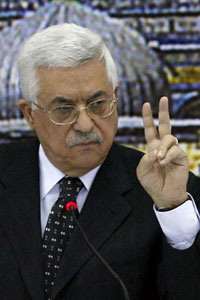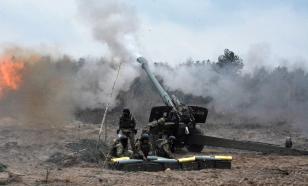Israeli actions hinder peace with Palestine
Mahmoud Abbas, Palestinian President, accused Israel of impeding preparations for a Mideast conference and notified U.S. Secretary of State Condoleezza Rice that there's not much time is left to write a joint peace document with Israel.

Abbas' sharp words came after his second meeting with Rice this week, and a senior Palestinian official said Abbas was disappointed by U.S. suggestions that the Palestinians significantly scale back their demands.
The Palestinians have made a joint document, which would address the key issues of the conflict, a requirement for holding the conference, to be held in November or December in Annapolis, Maryland.
The document should include at least a sentence or two on how to solve each of the issues of dispute, such as borders and Jerusalem, the Palestinians have maintained.
The Palestinians' core demand is that the future border between Israel and Palestine be based on the pre-1967 Mideast War lines, with modifications through land swaps that would enable Israel to annex large West Bank settlements.
However, Rice asked Abbas whether he could accept a more vaguely worded statement, which would not mention the 1967 lines, said a Palestinian official who spoke on condition of anonymity because he was not authorized to speak to reporters about the closed meeting.
Rice also asked whether the Palestinians were willing to drop a mention of Palestinian refugees, one of the so-called core issues, from the document, the official said.
The secretary left Ramallah after the meeting without speaking to reporters, but was expected to hold a news conference later in the day.
In Washington, President George W. Bush said he was pleased with Rice's progress and promised a staunch U.S. effort to make the conference a success.
"The reason why there needs to be a vision of what a state could look like is because the Palestinians that have been made promises all these years need to see there's a serious, focused effort to step up a state," Bush said.
He also said he is seeking an Arab "buy-in" for a peace deal. Arab countries have been reluctant to commit to attending the conference unless there are guarantees that it will yield firm results.
Abbas had harsh words for Israel. He said recent Israeli actions, including army raids and a decision to renew excavations near a key Jerusalem holy site, "are hindering the endeavor to reach a document with substance, to go to the conference."
Abbas warned that little time is left to prepare for the conference. "Efforts should be extensive," he said. "We must not waste time."
Abbas aides said Rice is to return in early November.
Rice had started her day with a visit to Jesus' traditional birthplace in the West Bank town of Bethlehem. Rice, the daughter and granddaughter of Presbyterian ministers, lit a candle in the grotto and paused for prayer.
"Being here at the birthplace of my Lord and Savior, Jesus Christ, has been a very special and moving experience," said Rice. "It is also, I think, a personal reminder that the prince of peace is still with us."
She saidthe three monotheistic religions of the Holy Land, Judaism, Christianity and Islam, "have an opportunity to overcome differences, to put aside grievances, to make religion a power of healing and a power of reconciliation, rather than a power of divisions."
In Bethlehem, Rice got a firsthand look at Israel's contentious West Bank separation barrier, which lines the town on two sides.
Her convoy passed twice through a gate in the towering wall that cuts off Bethlehem from Jerusalem. Also, the hotel where she met civic leaders was just a few yards (meters) from the wall and an Israeli watchtower.
Israel started building the West Bank barrier in 2002, initially portraying it as a temporary defense against Palestinian attackers who have killed hundreds of Israelis in recent years. However, the barrier's meandering route and massive cost suggest it could be used as the basis for a future border.
Bethlehem residents need difficult-to-obtain permits to cross through a wall terminal into Jerusalem, and long lines often form during rush hour.
Rice left Bethlehem after about three hours, then headed to the West Bank town of Ramallah, for talks with Abbas. Later Wednesday, she met with Israeli Prime Minister Ehud Olmert and other Israeli leaders.
Israeli and Palestinian negotiators are trying to write a joint document of principles that would guide future peace talks. Tensions arose earlier in the week when Olmert said such a document is not a prerequisite for the conference, to be held in Annapolis, Maryland.
The Palestinians want the conference to relaunch peace talks, and seek an internationally backed deadline for reaching a peace agreement.
The U.S. appears to favor the idea of a document, but has been cool to the notion of a timeline.
The U.S. has not set a date yet or issued invitations but hopes key Arab states, including Egypt, Jordan and Saudi Arabia, will attend. Arab leaders have said that before accepting an invitation, they want to be sure the conference deals with substance.
A senior Abbas aide, Nabil Abu Rdeneh, said Wednesday the gaps between the Israeli and Palestinian positions remain wide, and that "the credibility of the U.S. administration depends on the pressure that it is willing to exert on Israel."
And Palestinian negotiator Saeb Erekat said a final deal should be concluded before U.S. election campaigning gets into high gear next summer.
"After that, all the U.S. will be busy with the election in the U.S.," Erekat said.
Another Abbas aide, Ahmed Abdel Rahman, said the Palestinian president told Rice that Israel should release 2,000 Palestinian prisoners as a gesture at the time of the conference. More than 11,000 Palestinians are currently held in Israel on security-related charges.
Israeli Foreign Ministry spokesman Mark Regev acknowledged that gaps exist between Israeli and Palestinian negotiators.
"What is required is serious work and we are committed to that," he said. "Ignoring that gap is to ignore reality and a successful peace process cannot be based on ignoring reality."
Subscribe to Pravda.Ru Telegram channel, Facebook, RSS!


